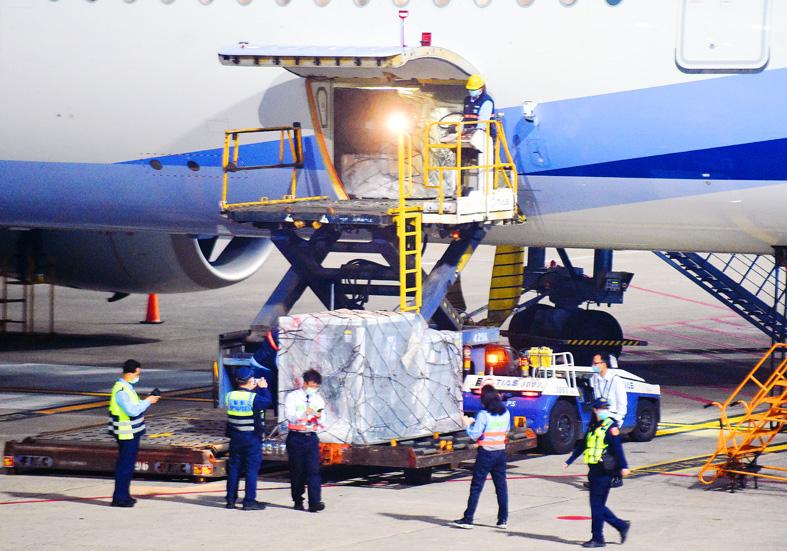The first batch of COVID-19 vaccines allocated to Taiwan through the COVAX global vaccine-sharing program arrived yesterday, the Food and Drug Administration (FDA) said, adding that, after testing, it would be able to distribute them by Monday next week at the earliest.
The 199,200 doses of the AstraZeneca vaccine were shipped from Amsterdam on a China Airlines (中華航空) plane and arrived at Taiwan Taoyuan International Airport at 5:21am.
After the cargo was examined and release procedures were completed at the airport, the Aviation Police Bureau escorted the vehicles carrying the vaccines to a cold chain storage facility.

Photo: Chu Pei-hsiung, Taipei Times
Centers for Disease Control Deputy Director-General Chuang Jen-hsiang (莊人祥), the Central Epidemic Command Center’s (CECC) spokesperson, said that the batch would expire on May 31, while the AstraZeneca vaccine currently being administered expires on June 15, so the center might consider expanding vaccination eligibility.
Taiwan has so far received 316,200 doses of the AstraZeneca vaccine, as the first batch that arrived last month comprised 117,000 doses.
The FDA said that it would have to complete a document review and seven types of tests on the new batch of vaccines before releasing them for distribution.
Chuang said that as vaccine recipients are required to receive a second dose of the AstraZeneca vaccine at least eight weeks after the first, the center is leaning toward administering the 199,200 doses of vaccine as a first dose only, in hopes that they would be used up before they expire.
Meanwhile, Taiwan yesterday reported two imported cases of COVID-19: a Taiwanese man who returned on a medical charter flight and an Indonesian student.
The Taiwanese man is in his 60s, works in the Philippines and tested positive for COVID-19 last week after he had a fever on March 23, and also experienced shortness of breath and loss of taste on Monday and Tuesday last week, Chuang said.
The man boarded a medical charter flight on Friday and was hospitalized and tested after arriving in Taiwan on Saturday, he said.
His test for COVID-19 came back positive yesterday, Chuang said, adding that he has pneumonia and is receiving oxygen through a nasal catheter, but does not need a ventilator or extracorporeal membrane oxygenation.
The Indonesian student is in his 20s, arrived in Taiwan on Wednesday, and experienced a fever, runny nose and headache on Friday at a centralized quarantine facility, he said.
The 14 passengers who sat close to him on the flight to Taiwan have been placed under home isolation, Chuang added.

The Ministry of the Interior (MOI) is to tighten rules for candidates running for public office, requiring them to declare that they do not hold a Chinese household registration or passport, and that they possess no other foreign citizenship. The requirement was set out in a draft amendment to the Enforcement Rules of the Public Officials Election and Recall Act (公職人員選舉罷免法 ) released by the ministry on Thursday. Under the proposal, candidates would need to make the declaration when submitting their registration forms, which would be published in the official election bulletin. The move follows the removal of several elected officials who were

The Republic of China (ROC) is celebrating its 114th Double Ten National Day today, featuring military parades and a variety of performances and speeches in front of the Presidential Office in Taipei. The Taiwan Taiko Association opened the celebrations with a 100-drummer performance, including young percussionists. As per tradition, an air force Mirage 2000 fighter jet flew over the Presidential Office as a part of the performance. The Honor Guards of the ROC and its marching band also heralded in a military parade. Students from Taichung's Shin Min High School then followed with a colorful performance using floral imagery to represent Taiwan's alternate name

COVETED PRIZE: The US president would be a peace prize laureate should he persuade Xi Jinping to abandon military aggression against Taiwan, William Lai said US President Donald Trump should get the Nobel Peace Prize should he be able to convince Chinese President Xi Jinping (習近平) to abandon the use of force against Taiwan, President William Lai (賴清德) told a conservative US radio show and podcast in an interview. The US is Taiwan’s most important international backer, despite the absence of formal ties, but since Trump took office earlier this year he has not announced any new arms sales to the nation. Trump could meet Xi at the APEC summit in South Korea on Oct. 31 and Nov. 1. Lai, speaking on The Clay Travis and Buck Sexton

A Chinese takeover of Taiwan would severely threaten the national security of the US, Japan, the Philippines and other nations, while global economic losses could reach US$10 trillion, National Security Council Deputy Secretary-General Lin Fei-fan (林飛帆) wrote in an article published yesterday in Foreign Affairs. “The future of Taiwan is not merely a regional concern; it is a test of whether the international order can withstand the pressure of authoritarian expansionism,” Lin wrote in the article titled “Taiwan’s Plan for Peace Through Strength — How Investments in Resilience Can Deter Beijing.” Chinese President Xi Jinping’s (習近平) intent to take Taiwan by force